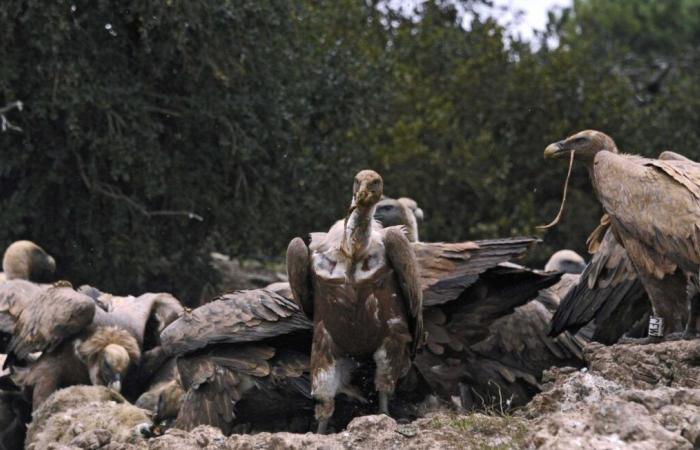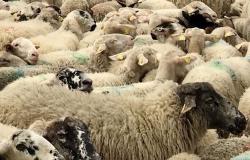“To me, vultures are like squatters. They come to your house uninvited and rob you! » Fabien, a cattle breeder in the great Causses of Aveyron, does not mince his words against scavengers. It must be said that because of them, he has been sleeping much less well at night since November 9. That day, a neighbor called him to alert him to the presence of vultures on one of his plots. “In fact, there were 150 to 200,” says the operator. With a calving cow in their sights. “My father had seen her three days earlier in good health. She tried to escape, she even broke two rows of barbed wire, but they cornered her and killed her.”
“I don’t raise cows to feed the vultures” annoys Fabien, hit “directly in the wallet”. Because the loss of her breeding hen and her future calf will not be compensated. Unlike Pyrenees bears, griffon vultures, also a protected species, are not considered predators.
“Just hearing the word makes my hairs stand on end”
However, the story had started well between the “griffins”, as the ancients said, and the “earthlings” of the Grands Causses. “At the beginning, in the 1980s, when they started to reappear, we found it wonderful, miraculous, we even called the guy in the paraglider to come and ring them,” remembers Samuel Maymard, co-secretary general of the FDSEA. “But now, just hearing the word makes my hackles stand on end. There have been 30 attacks since January 1,” storms the union representative, convinced that there are now aggressive and “deviant” vultures in the area, attacking living animals. “With all the deer and wild boars dead on the side of the roads, if they do that, it’s because they have become far too numerous,” he argues.
“Since 2020, more than 170 reports between griffon vultures or cattle have been recorded,” indicates the Aveyron prefecture, for whom these gliding birds are becoming “a growing concern”. As proof, the decree – quite exceptional for Aveyron – taken on November 12. It authorizes, “on an experimental basis”, to carry out scare shots. From March 15 to November 1, 2025 and 2026, breeders trained by agents of the French Office for Biodiversity (OFB), and with the green light from the administration, will be able to shoot “blank” birds at birds to “provoke their flight without harming their state of conservation.
They are “not at all suitable for attacking”
On the side of the Bird Protection League (LPO), the measure remains in the throat. Firstly because during the public consultation organized on the appropriateness of these scares, 95% of the 890 contributors answered “no”. “Funny concept of participatory democracy,” quips Cédric Marteau, the general director of the LPO. The defender of birds especially recalls the ancestral usefulness of these scavengers. “They feed on animals that have died, often due to viruses or bacteria, and have the ability, through their metabolism, to neutralize these viruses and diseases,” he explains. Not to mention the famous “plots” of the causses where sheep breeders still carry their ewes and sheep corpses to be devoured, saving rendering costs.
Cédric Marteau disagrees with the “fable” of “deviant” animals and does not believe in the “attacks” on living animals that “certain breeders” describe. “Vultures are not at all adapted to attack, they have neither claws nor claws but legs, like turkeys,” he emphasizes. “Today across Aveyron, we have three to five cases per year of interactions with domestic animals, mainly cows at calving time, where we see that the vultures are around the animal, without knowing if the calf was alive or stillborn and without knowing if it would have survived without the vultures.” Difficult to arbitrate the spat when the figures diverge to this point.
“The first step of a grand staircase”
But there is at least one thing that friends and detractors of vultures agree on: the limited usefulness of scaring shots. “When will they take place? asks Cédric Marteau. Because these animals do not wait around the herd for cows to calve. These birds of prey can travel up to a hundred kilometers to look for food and they use olfaction, particularly the smell of blood. The breeder would therefore have to be there at the same time to shoot.”
Fabien – who on November 9 ended up dispersing the colony by climbing on his quad – is not too convinced either. “To shoot, I would already have to have my hunting license and that is not the case,” says the man who was advised by an “expert” to bang pots. “We are not going to spend our time shooting in the air,” judge Samuel Maymard. Scaring is only the first step on a grand staircase. The opportunity to renew dialogue with the LPO and for them to accept a real regulatory solution.” The farmer has his own idea: “regulate on eggs, slightly old vultures…”. In short, take much more radical measures, at the risk of getting your feathers ruffled.






